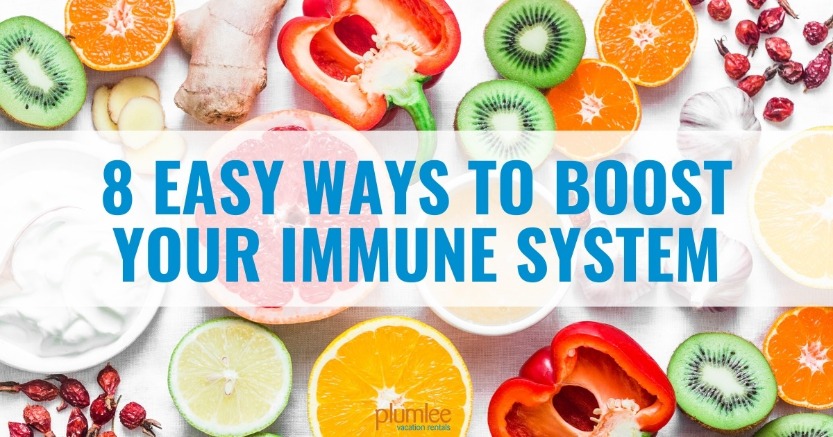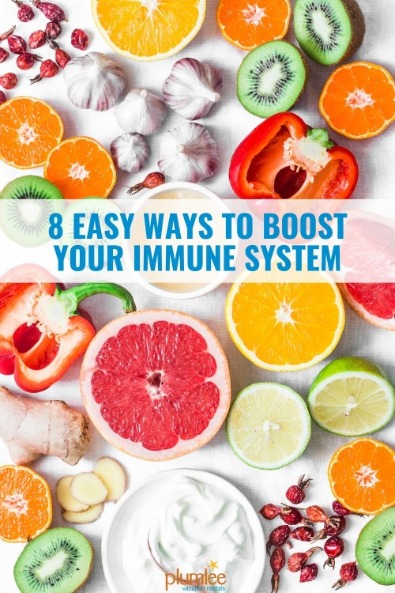
We all want to maintain optimal health throughout the year—especially during these days and times. Boosting your immunity may be helped along naturally by establishing healthy habits that keep your body, mind and spirit functioning at their best. Take a look at what the experts say about bolstering your immune system and how they relate to your life habits. Researchers are still exploring the science behind your complex immune system and its correlation to lifestyle, but you can still be proactive and make positive changes that make you feel better in your daily life.
The idea of boosting your immunity is enticing, but the ability to do so has proved elusive for several reasons. The immune system is precisely that — a system, not a single entity. To function well, it requires balance and harmony. There is still much that researchers don’t know about the intricacies and interconnectedness of the immune response.
Researchers are exploring the effects of diet, exercise, age, psychological stress, and other factors on the immune response, both in animals and in humans. In the meantime, general healthy-living strategies are a good way to start giving your immune system the upper hand.
HOW TO BOOST YOUR IMMUNITY NATURALLY
Your first line of defense is to choose a healthy lifestyle. Following general good-health guidelines is the single best step you can take toward naturally keeping your immune system strong and healthy. Every part of your body, including your immune system, functions better when protected from environmental assaults and bolstered by healthy-living strategies such as these.
1
HEALTHY EATING
Whole plant foods like fruits, vegetables, nuts, seeds, and legumes are rich in nutrients and antioxidants that may give you an upper hand in health. From feeding your healthy gut biomes to decreasing inflammation to high vitamin C content, fruits and veggies are definitely your friend.
2
MANAGE STRESS
Relieving stress and anxiety is key to immune health. Long-term stress promotes inflammation and imbalances in immune cell function. Activities that help manage stress include meditation, exercise, journaling, yoga, and other mindfulness practices. You may also benefit from seeing a licensed therapist.
3
GOOD SLEEP
Sleep and immunity are closely tied. Inadequate or poor quality sleep is linked to a higher susceptibility to sickness. Adults should aim to get 7 or more hours of sleep each night, while teens need 8–10 hours, and younger children and infants up to 14 hours. The quality and quantity of sleep matters!
4
EXERCISE REGULARLY
Regular, moderate exercise may reduce inflammation and help your immune cells regenerate regularly. Examples of moderate exercise include brisk walking, steady bicycling, jogging, swimming, and light hiking. Most people should aim for at least 150 minutes of moderate exercise per week.
5
GET OUTDOOR TIME
For even more immune system benefits, health experts recommend taking your exercise outside. Spending time in nature has been shown to bolster mood, lower blood pressure, reduce inflammation, and support immune system health. Sunshine also boosts vitamin D in the body, which plays a key role in immune health, too.
6
LIMIT ALCOHOL
Drinking high amounts of alcohol is associated with a range of negative health effects, including lowered immune function. When you drink high amounts of alcohol, your body is too busy trying to detoxify your system to bother with normal immune system function. High levels of alcohol consumption can also slow down recovery time if you do get sick.
7
STAY HYDRATED
Preventing dehydration is important to your overall health. Dehydration can cause headaches and hinder your physical performance, focus, mood, digestion, and heart and kidney function. These complications can increase your susceptibility to illness. As a general guideline, you should drink when you’re thirsty and stop when you’re no longer thirsty.
8
MAINTAIN CONNECTIONS
Having strong relationships and a good social network is good for you. People who feel connected to friends—whether it’s a few close friends or a large group—have stronger immunity than those who feel alone, studies show. Although there are many other things that affect your health, making meaningful connections with people is always a good idea.
DO YOU HAVE ANY IMMUNE SYSTEM BOOSTING TIPS?
We want to know what works for you and helps you to feel your absolute best.





